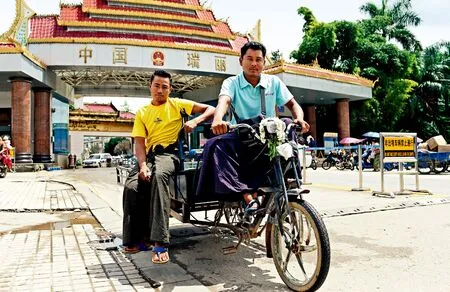DEHONG A LAND OF OPPORTUNITY FOR MYANMAR CITIZENS
By Yang Li
DEHONG A LAND OF OPPORTUNITY FOR MYANMAR CITIZENS
By Yang Li
Area on China-Myanmar border now home to more than 60,000 Myanmar citizens

Two vendors pose for a photo in front of the China-Myanmar border gate in Ruili City, China’s Yunnan Province.
In recent years, with the continuous expansion of Yunnan Province’s opening up, an increasing number of Myanmar citizens have come to Dehong Dai and Jingpo Autonomous Prefecture in Yunnan in southwest China. This stretch of territory along the China-Myanmar border attracts people for both full time jobs and day-to-day business. According to the Dehong Prefecture Bureau of Public Security, currently, the combined number of Myanmar citizens with either temporary or permanent residence status in Dehong has reached 62,047, among which 24,772 Myanmar citizens are employed by local companies.
Experiencing ‘Pauk Phaw’Friendship
“Although I have been in Dehong for just a couple ofmonths, I have seen in person that the Chinese people are very friendly to us Myanmar citizens,” explained a 36-yearold from Myanmar known in Chinese as Min Mosuo, who has been working with a cultural communication company in Ruili City of Dehong for the past eight months. “Therefore, I hope to acquaint myself with more Chinese people in the future.”
In his company’s yard, there are a wide range of crafts with Chinese minority ethnic characteristics on display. Min’s job is to look after polishing and coloring, and pieces of handicrafts are thus born lifelike from his dexterous hands. As Min polished a piece of art, he explained that before coming to Ruili, he had been working at a rubber plantation in Myanmar. The work environment and wages were both poor, he said. When a friend asked Min if he would like to come to Ruili to find better opportunities, he jumped at the chance.
After arriving in Ruili and finding work, Min studied diligently and quickly mastered the techniques of polishing and coloring.
“I get along very well with Chinese people and feel a strong sense of security here,”Min said. “Because my Chinese is poor, it is difficult for me to communicate with Chinese people. But overall, I enjoy my life in Dehong not just because I have earned much more money than I did in Myanmar, but I have also learned new skills and personally felt the ‘pauk phaw’friendship that exists between Chinese and Myanmar people.”

Ruili’s economic development has attracted businesspeople from both China and Myanmar. Pictured, a businessman shows offa type of jade unique to Myanmar in Ruili in 2014.
'The locals here treat us like members of their family, and it makes us feel at home.'
Land of Opportunity
“Sometimes I miss my home back in Myanmar because this is the first time I’ve left my family and gone abroad,”said an 18-year-old from Myanmar known in Chinese as Tang Shaoqiang. “However, I’m confident I’ll gradually get used to things here.”
Tang has been working at a hotel in Ruili for four months. He said he doesn’t feel uncomfortable there, in part because of the large Myanmar community already living in Ruili.
Tang has four siblings and their living conditions in Myanmar are poor. He plans to work hard to improve his family’s financial situation.
“Although I am working in a service job at a hotel right now, I will make sure I do a good job,” Tang said. “Only through continuous learning and progress, particularly after I master a skill, can my income increase. However, I do miss home, particularly during the weekends when I call home and talk to my family. But I know it’s worth it to stay here and work hard.”
Chinese ‘Family’
“One year ago, I had to go to the hospital with illness,”explained a 32-year-old from Myanmar living in Ruili who is known in Chinese as Pu Kuanmai.
That night about one year ago, Pu had begun to feel ill late into the night and with no taxis running, her Chinese roommate took her to the hospital. As Pu recovered over the next few days, her roommate was constantly by her side.
“The locals here treat us like members of their family, and it makes us feel at home,” Pu added.
Pu has been working as a waitress at a Ruili hotel for more than two years, and is now very familiar with the local area. She has five siblings in Myanmar and sends money home to them.
“When I first arrived here, I wasn’t sure if I would be able to get used to everything,” Pu said. “But now, I have realized that people here are very kind. I really enjoy my life in China. When I return to Myanmar, I will tell people there that Chinese people in Ruili treated me like family. The friendship between the people of China and Myanmar is solid.”

